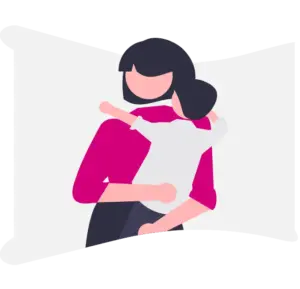Trauma-Focused Cognitive Behavioral Therapy (TF-CBT/CBT)

TF-CBT – Evidence-based; trauma-sensitive; gradual exposure; suitable for ages 3-17 with traumatic experiences; easily learned by therapists.
Practitioners of TF-CBT strive to give parents the resources and skills necessary to help their children cope with the psychological ramifications of the abuse or other trauma.
Core components of TF-CBT include:
- Psychoeducation and parenting skills
- Relaxation
- Affective regulation
- Cognitive processing of the trauma
- Trauma narrative
- In vivo mastery of trauma reminders
- Conjoint child-parent sessions
- Enhancing future safety and development
The success of TF-CBT relies heavily on a trusting, genuine therapeutic relationship between therapist, child, and parent.
What is Cognitive Behavioral Therapy?
Cognitive behavioral therapy (CBT) is a form of psychological treatment that has been demonstrated to be effective for a range of problems including depression, anxiety disorders, alcohol and drug use problems, marital problems, eating disorders, and severe mental illness. Numerous research studies suggest that CBT leads to significant improvement in functioning and quality of life. In many studies, CBT has been demonstrated to be as effective as, or more effective than, other forms of psychological therapy or psychiatric medications.
It is important to emphasize that advances in CBT have been made on the basis of both research and clinical practice. Indeed, CBT is an approach for which there is ample scientific evidence that the methods that have been developed actually produce change. In this manner, CBT differs from many other forms of psychological treatment.
CBT is based on several core principles, including:
- Psychological problems are based, in part, on faulty or unhelpful ways of thinking.
- Psychological problems are based, in part, on learned patterns of unhelpful behavior.
- People suffering from psychological problems can learn better ways of coping with them, thereby relieving their symptoms and becoming more effective in their lives.
- CBT treatment usually involves efforts to change thinking patterns. These strategies might include:
- Learning to recognize one’s distortions in thinking that are creating problems, and then to reevaluate them in light of reality.
- Gaining a better understanding of the behavior and motivation of others.
- Using problem-solving skills to cope with difficult situations.
- Learning to develop a greater sense of confidence in one’s own abilities.
CBT treatment also usually involves efforts to change behavioral patterns. These strategies might include:
- Facing one’s fears instead of avoiding them.
- Using role playing to prepare for potentially problematic interactions with others.
- Learning to calm one’s mind and relax one’s body.
Not all CBT will use all of these strategies. Rather, the psychologist and patient/client work together, in a collaborative fashion, to develop an understanding of the problem and to develop a treatment strategy.
CBT places an emphasis on helping individuals learn to be their own therapists. Through exercises in the session as well as “homework” exercises outside of sessions, patients/clients are helped to develop coping skills, whereby they can learn to change their own thinking, problematic emotions, and behavior.